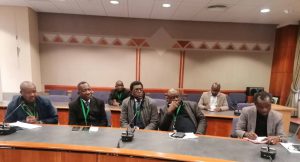
MPs of National Council during Bill deliberation session
The Ministry of Urban and Rural Development briefed Members of Parliament on the long-awaited Constituency Development Fund on Friday, 5 August 2022. MPs expressed disappointment at the slow pace and lack of urgency with which the Bill, commonly referred to as the CDF Bill, has been handled. MPs stressed that the passing and implementation of the Bill is long overdue and that the reasons provided for the delay cannot be acceptable seven years after the Bill was passed by the National Council to the National Assembly in 2015. To date, it is yet to come on the floor of the National Assembly.
The briefing was a follow up of the December 2021 meeting where Minister of Urban and Rural Development, Hon. Erastus Uutoni met with Members of the National Council to brief them on the status of the Constituency Development Fund Bill. At the time, the Minister informed the Members that consultations by the Cabinet Committee on Treasury had been concluded and that as of July 2020, the Bill had made significant progress, refuting the perception by some that the Bill is now collecting dust and not being attended to. During this meeting, Chairperson of the National Council, Hon. Lukas Muha noted that the refining process of any Bill was very important and was thus appreciated, as it would produce a quality product that would serve the electorate.” However, in the latest meeting on Friday, Members were not as understanding and receptive of feedback provided by the Ministry’s representative.
Director for Decentralization Coordination, Godwin Sikabongo who represented the Ministry stated that a number of adjustments were made and that the major concentration was now on the legal consistency to ensure that it would not be in contradiction to other legislation. Sikabongo assured the Members that the Ministry takes the Bill and the matter very seriously and are doing everything to bring it to finality.
Hon. Muha told the meeting that the realization of this Bill is a collective effort. “If the constituencies are not well served, it affects us all, as Constituency Councillors all the way up to the level of the Ministry. The Bill has taken long, and the time is now that it reaches Parliament for more discussion and let those errors that are delaying the Bill be fixed along the way. Let the English and legal jargon not hinder the progress if we agree on the principal of the Bill”, said Hon. Muha. The same sentiments were expressed by other MPs, including Independent Candidate, Hon. Paulus Mbangu who said the process has taken too long and that he was disappointed with the reasons provided for the delay. Another MP, Hon. Daniel Kuuoko noted that the basics of the Bill is to enhance service delivery, and on that basis, must be handled with the urgency it deserves. Kabbe South Constituency Councillor, Hon. John Likando said that in neighbouring Zambia, the provision of constituency funds had proven to bring relief to the people. He further noted taking this kind of feedback to the people was difficult and that those who hold political and civil office would do good to remember that they too, will one day retire and go home to face the challenges that the people are faced with.
In concluding the briefing session, the Chairperson stated that the idea of the CDF Bill should follow the Decentralization Act. “People on the ground know best, they have the solutions and abilities. Gone are the days when we thought people in Windhoek are the only ones with the solutions,” said Hon. Muha
ABOUT THE CDF BILL
Once passed, the CDF Bill will become a historic Act of Parliament, as it will be the first piece of legislation to have emanated from the National Council. The CDF is aimed to empower the local communities at constituency level with resources to initiate and implement their own development projects as per their needs. This, the National Council believes, will provide targeted assistance to aid in the development of constituencies around the country by way of decentralising government projects, expediting service delivery and removing the bureaucracy that often slows down service delivery.
The Bill stipulates that the funds are to be equally distributed across all constituencies irrespective of population size and level of development, and will go towards activities such as boreholes drilling, provision of essential services, infrastructure development and maintenance, youth and sports development, community capacity building initiatives as well as activities relating to the safeguarding of the environment activities.
Currently, the law prescribes that constituency offices be funded through subsidy from the regional government. The Local Authorities Act 23 of 1992 (as amended in 2000) states that there shall be levies equalling 5% of the rates levied on all rate-able property, situated in Local Authority Areas for the benefit of the funds of regional councils. However, these funds are mainly for administrative needs such as salaries and not enough is left for addressing the development needs of community members on the various constituencies across Namibia.
Similar initiatives have been initiated in countries such as Zambia and Kenya and have proven effective in addressing the needs of the people.






